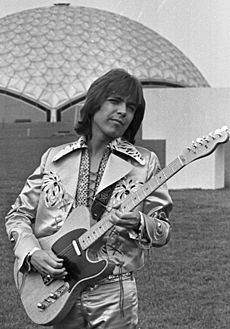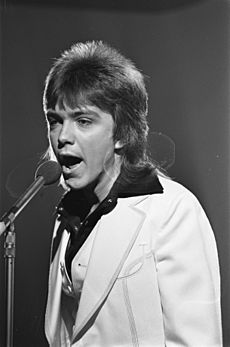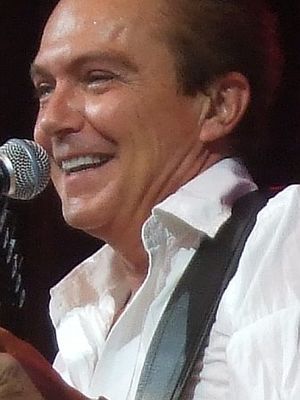David Cassidy facts for kids
Quick facts for kids
David Cassidy
|
|
|---|---|
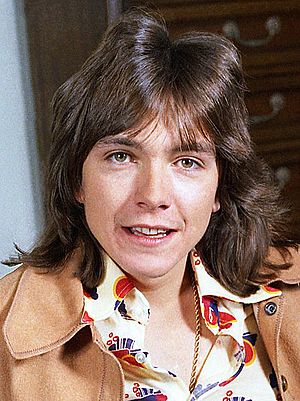
Cassidy at the Plaza Hotel, New York City, 1972
|
|
| Born | April 12, 1950 New York City, U.S.
|
| Died | November 21, 2017 (aged 67) Fort Lauderdale, Florida, U.S.
|
| Occupation |
|
| Years active | 1969–2017 |
| Spouse(s) |
|
| Children | 2; including Katie Cassidy |
| Parent(s) |
|
| Family |
|
| Musical career | |
| Genres | |
| Instruments |
|
| Labels |
|
| Associated acts | The Partridge Family |
David Bruce Cassidy (April 12, 1950 – November 21, 2017) was a famous American actor, singer, and guitarist. He was best known for playing Keith Partridge in the 1970s TV show The Partridge Family. This role made him a huge pop star and a "teen idol" in the 1970s.
Contents
David Cassidy's Early Life
David Cassidy was born in New York City. His father, Jack Cassidy, was a singer and actor. His mother, Evelyn Ward, was an actress. Because his parents often traveled for work, David spent his early years with his grandparents. They lived in West Orange, New Jersey.
In 1956, David learned that his parents had divorced. This was a surprise to him. Later that year, his father married singer and actress Shirley Jones. David gained three half-brothers: Shaun Cassidy, Patrick, and Ryan.
In 1968, David finished high school. He then moved in with his father and stepmother in Irvington, New York. He worked part-time while trying to become an actor and musician. When his career started to take off, he moved out.
David's father helped him find his first manager, Ruth Aarons. She was a talent manager with a theater background. Ruth helped David sign with Universal Studios in 1969. She also helped him get a better contract for The Partridge Family show. Ruth became a close friend and a big help in his career.
David Cassidy's Career Journey
Starting Out in the 1960s
David Cassidy began his professional acting career in 1969. He appeared in a Broadway musical called The Fig Leaves Are Falling. Even though the show closed quickly, a casting director noticed him. This led to a screen test. In 1969, he moved to Los Angeles. After signing with Universal Studios, David appeared in several TV shows. These included Ironside, Marcus Welby, M.D., and Bonanza.
Becoming a Star in the 1970s
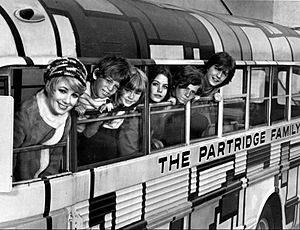
In 1970, David got the role of Keith Partridge in The Partridge Family. This was a musical TV show. He showed off his singing skills and became the lead singer for the show's band. David and Shirley Jones were the only actors from the show who sang on the actual recordings.
The show became very popular. The first song released by The Partridge Family, "I Think I Love You", was a big hit. David then started making his own solo albums. These included Cherish and Rock Me Baby, both released in 1972. His song "Cherish" reached number nine in the U.S. and number one in Australia.
David had even greater success with his solo music in the UK. His songs "Daydreamer" and "How Can I Be Sure" were very popular there. For a short time, he was one of the highest-paid entertainers in the world. His fan club was bigger than those of other huge stars.
David wanted to be a respected rock musician. However, his fame made him a "teen idol." He didn't like this label at first, but he later accepted it. Ten albums by The Partridge Family and five solo albums by David were released. Most of them sold over a million copies.
David's solo career was a huge success around the world. His concerts sold out in large stadiums. This led to the media calling the excitement "Cassidymania." For example, he performed for 56,000 people at the Houston Astrodome in 1972. His concert at Madison Square Garden in New York sold out in one day.
A sad event happened at a concert in London in 1974. Many people were injured in a crowd surge. A 14-year-old girl, Bernadette Whelan, sadly passed away a few days later. David was deeply affected by this. He decided to stop touring and acting in The Partridge Family. He wanted to focus on recording music and songwriting.
David continued to have international success, especially in Great Britain, Germany, and Japan. He released three solo albums in 1975 and 1976. He was the first artist to have a hit with the song "I Write the Songs."
In 1978, David starred in an episode of Police Story. He was nominated for an Emmy Award for his role. A TV series based on it, David Cassidy: Man Undercover, was created but only lasted one season.
Music and Theater in the 1980s
By the 1980s, David Cassidy faced financial challenges. In 1985, he had another music hit with "The Last Kiss." This song reached number six in the United Kingdom. It featured backing vocals by George Michael. David then toured the UK, which led to a live album.
David also performed in musical theater. In 1982, he starred in the Broadway show Joseph and the Amazing Technicolor Dreamcoat. He also appeared in London's West End in Time. Later, he returned to Broadway in Blood Brothers with his half-brother Shaun Cassidy.
Later Career Highlights
David Cassidy returned to the American music charts in 1990 with "Lyin' to Myself." He released more albums in the 1990s. In 1998, his song "No Bridge I Wouldn't Cross" was popular on adult contemporary radio.
From 1996 to 1998, David starred in the Las Vegas show EFX. In 2000, he wrote and performed in another Las Vegas show, At the Copa. His 2001 album Then and Now sold very well internationally. It put him back in the top five of the UK album charts.
In 2005, David played a manager in the film Popstar. He also co-starred with his half-brother Patrick in the TV series Ruby & The Rockits in 2009. This show was created by Shaun Cassidy. In 2011, David was a contestant on Celebrity Apprentice.
David often held question-and-answer sessions at his concerts. He enjoyed talking with fans who had supported him for many years.
David Cassidy's Personal Life
David Cassidy was married three times. His first wife was actress Kay Lenz. They were married from 1977 to 1983.
His second wife was Meryl Tanz, a horse breeder. They married in 1984 and divorced in 1988.
David had a daughter, actress Katie Cassidy, born in 1986. Katie was raised by her mother and stepfather. David later said he was proud of her talent.
David married his third wife, Sue Shifrin, in 1991. They had a son named Beau in 1991. They separated in 2013 and divorced in 2016.
David moved to Fort Lauderdale, Florida, in 2002.
Helping Others
In 2011, David Cassidy recorded a public service announcement. It was about Alzheimer's disease research and prevention. His mother had this condition. He planned to speak to Congress about it.
David was a long-time supporter of the Democratic Party.
Illness and Passing
In February 2017, David Cassidy announced he was living with dementia. He had trouble remembering song lyrics during a performance. He decided to retire from performing. He mentioned that his mother and grandfather also had dementia.
Later in 2017, David became very ill and was hospitalized. He had liver failure and kidney failure. He was in a serious condition. Doctors hoped to find a liver for a transplant. However, David Cassidy passed away on November 21, 2017, at age 67. His daughter said his last words were, "So much wasted time."
David Cassidy's Books
In 1994, David Cassidy wrote his autobiography with Chip Deffaa. It was called C'mon, Get Happy ... Fear and Loathing on the Partridge Family Bus. A new version was released as an e-book in 2019.
David also wrote another memoir, Could It Be Forever? My Story. This book was published in the United Kingdom in 2007. It shared more details about his personal life.
Discography
Filmography
| Year | Title | Role | Notes | Reference |
|---|---|---|---|---|
| 1968 | Dragnet | Tim Richmond | Episode: "The Big Departure" | |
| 1969 | The Survivors | Mike | Episode: "Chapter Seven" | |
| 1969 | Ironside | Danny Goodson | Episode: "Stolen on Demand" | |
| 1970 | Adam-12 | Tim Richmond | Episode: "Log 24 A Rare Occasion" | |
| 1970 | Bonanza | Billy Burgess | Episode: "The Law and Billy Burgess" | |
| 1970 | Marcus Welby, M.D. | Michael Ambrose | Episode: "Fun and Games and Michael Ambrose" | |
| 1970 | Medical Center | Rick Lambert | Episode: "His Brother's Keeper" | |
| 1970 | The Mod Squad | Brad Johnson | Episode: "The Loser" | |
| 1970 | The F.B.I. | Larry Wentworth | Episode: "Fatal Impostor" | |
| 1970–74 | The Partridge Family | Keith Partridge | 96 episodes | |
| 1978 | Police Story | Officer Dan Shay | Episode: "A Chance to Live" | |
| 1978–79 | David Cassidy: Man Undercover | Officer Dan Shay | 10 episodes; also composer of theme music | |
| 1980 | The Love Boat | Ted Harmes | 1 episode | |
| 1980 | The Night the City Screamed | David Greeley | TV movie | |
| 1980/83 | Fantasy Island | Jeremy Todd / Danny Collier | 2 episodes | |
| 1982 | Matt Houston | John Gordon Boyd | Episode: "Joey's Here" | |
| 1983 | Parade of Stars | George M. Cohan | TV movie | |
| 1983 | Tales of the Unexpected | Donald / David | Episode: "Heir Presumptuous" | |
| 1988 | Alfred Hitchcock Presents | Joey Mitchell | Episode: "Career Move" | |
| 1990 | Instant Karma | Reno | ||
| 1990 | The Spirit of '76 | Adam-11 | ||
| 1991 | Blossom | Himself | Episode: "A Rockumentary" | |
| 1991 | The Flash | Sam Scudder/Mirror Master | Episode: "Done with Mirrors" | |
| 1992 | The Ben Stiller Show | David Cassidy | Episode: "With Flea" | |
| 1995 | The John Larroquette Show | Jefferson Kelly | Episode: "Wrestling Matches"; also composer of theme music | |
| 2003 | Malcolm in the Middle | Boone Vincent | Episode: "Vegas" | |
| 2003 | The Agency | Everett Price | Episode: "War, Inc." | |
| 2004 | Kim Possible | Roland Pond (voice) | Episode: "Oh Boyz" | |
| 2005 | Less than Perfect | Vince | Episode: "Playhouse" | |
| 2005 | Popstar | Grant | ||
| 2009 | Ruby & The Rockits | David Gallagher | 10 episodes | |
| 2011 | Celebrity Apprentice | Himself/contestant | 2 episodes | |
| 2013 | CSI: Crime Scene Investigation | Peter Coe | Episode: "Last Woman Standing" |
See also
 In Spanish: David Cassidy para niños
In Spanish: David Cassidy para niños
 | William M. Jackson |
 | Juan E. Gilbert |
 | Neil deGrasse Tyson |


